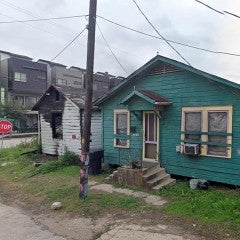According to the 2023 State of Housing report by the Kinder Institute for Urban Research, 58% of households in the city were renters in 2021, while 45% of Harris County households rented during the same period. For these renters, accessing the financial stability to become future homeowners, including a strong credit score and savings toward a down payment and closing costs, is often out of reach — and it is becoming only more difficult.
As rent prices increase, renters in Houston and Harris County continue to become more cost-burdened, meaning that the cost of rent makes it difficult to cover other essential costs, such as child care, health care, food and transportation. According to the 2023 State of Housing report, about 60% of Houston and Harris County renters were considered cost-burdened in 2021. This makes sense, as rent prices outpaced household income from 2015 to 2021. When more and more of one’s income must go toward covering rent and other essential needs, there is little room to build savings to purchase a home.
The report's findings paint a vivid picture of the pressing need for collaborative and innovative solutions to address the affordability crisis in our region and support those who want to become homeowners. The complexity and depth of these issues mean no single government or organization can solve them. But when working in concert, we can make a real difference.
In 2022, the Houston office of Local Initiatives Support Corp. (LISC) and nine other partners committed to fostering equitable homeownership opportunities by forming the Harris County Homeownership Collaborative.
With support from Wells Fargo, the Collaborative is working across multiple issues centered around bridging the homeownership gap for persons of color. As mentioned in the 2023 report, less than 36% of Black households and less than 52% of Hispanic households are homeowners in Harris County. By comparison, about 70% of White households are homeowners.
The Collaborative’s goal is to support 5,000 new households of color in achieving their dream of homeownership by the end of 2025 while also assisting existing homeowners of color in preserving their cherished homes. This initiative aims to do this by advancing several key strategies, including:
- Innovations that reduce construction costs and create housing stock, such as manufactured or modular homes,
- Comprehensive outreach and education campaigns,
- Increasing access to flexible, affordable mortgage products, and
- Continuing policy efforts to address systemic barriers impacting homeownership.
Several of these strategies work directly to address the issues faced by renters who are experiencing financial strain but are looking to purchase a home one day.
For example, one Collaborative partner, Fifth Ward Community Redevelopment Corp., is leading an effort to create a lease-option program that allows residents to “try while working to buy.” The program, which is in the planning stages, would allow households to lease a home with a portion of their rent payments being placed into a savings account toward purchasing the home, which would be available to them after five years. This effort aims to help prospective homebuyers gradually save for down payment and maintenance expenses in a way that isn’t overly burdensome.
Another partner, Avenue, is implementing a program with the Collaborative’s other housing counseling agencies to help potential homebuyers of color build their credit — another key aspect of a household’s financial stability — by providing $250 in matching funds to open a secure credit card. Credit challenges are often higher for buyers of color and contribute to higher mortgage denial rates. Participants must agree to remain in financial counseling for at least six months and work with their counselor on their credit card usage. In addition, LISC is looking at opportunities to connect with current policy efforts championing alternative credit scores that focus on cash flow and on-time payments including rent.
The goal of these initiatives is to shape Houston and Harris County’s affordable housing landscape to ensure everyone can afford the safe and stable home they desire. One way we may know if we are successful is if over the next several years, the Kinder Institute State of Housing report shows an increasing trend toward homeownership in the region, particularly for people of color. This would mean that those renters who want to become future homeowners have been able to access innovative tools and resources to reach their goal despite the cost-burdened landscape they face.
Laura Jaramillo is executive director of the Houston branch of the Local Initiatives Support Corp., the nation's largest community development support organization.




